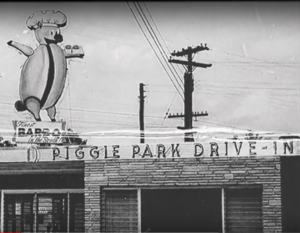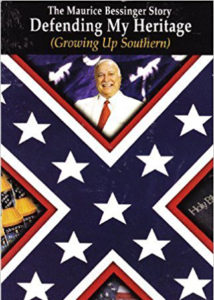A coalition of more than 80 pro-LGBTQ organizations says in a series of video ads an upcoming Supreme Court ruling on a wedding cake controversy could turn the clock back 50 years — when business owners could tell minority customers “we don’t serve your kind.”
The Open to All alliance — a collection of advocacy groups including the Association of Welcoming and Affirming Baptists — compares the upcoming decision in Masterpiece Cakeshop, Ltd. v. Colorado Civil Rights Commission to a historic 1968 court case over racial segregation.

Piggie Park barbecue drive-in
“Fifty years ago a barbecue chain called Piggie Park argued that serving African-American customers went against their religious beliefs, so they should have the right to discriminate,” one of the ads proclaims. “The Supreme Court disagreed.”
The Supreme Court held oral arguments in Dec. 5 in a case involving Jack Phillips, a Colorado baker cited for sexual orientation discrimination after he refused to design and create custom wedding cake for a same-sex couple, citing sincerely held religious beliefs.
Numerous groups including the Billy Graham Evangelistic Association, Becket Fund for Religious Liberty and Ethics and Religious Liberty Commission of the Southern Baptist Convention have filed legal briefs arguing that Christian-owned businesses should not have to compromise their beliefs in order to earn a living.

Maurice Bessinger described himself as an advocate of free enterprise and defender of Southern heritage in a 2004 autobiography. (Amazon.com)
Maurice Bessinger, a restaurant chain pioneer who popularized the mustard-based yellow sauce now characteristic of South Carolina barbecue, lost a similar argument 50 years ago, when the Supreme Court found his policy of serving only white people violated the Civil Rights Act of 1964.
Bessinger argued unsuccessfully in Newman v. Piggie Park Enterprises that the federal law barring discrimination based race, color, religion and national origin violated his freedom of religion under First Amendment “since his religious beliefs compel him to oppose any integration of the races whatever.”
A district court agreed that the restaurant owner was entitled to exercise his religion but “does not have the absolute right to exercise and practice such beliefs in utter disregard of the clear constitutional rights of other citizens.”
“This court refuses to lend credence or support to his position that he has a constitutional right to refuse to serve members of the Negro race in his business establishments upon the ground that to do so would violate his sacred religious beliefs,” the judgment read.
The Open to All campaign asks Americans if they “really want to give businesses a right to tell customers ‘we don’t serve your kind here,’ to humiliate them in front of their loved ones, to make parents explain to their children that a business won’t serve their kind of family?”
Bessinger, a devout Baptist who supported missionaries overseas, died an unrepentant segregationist in 2014. “I’m just a fair man,” he told The State newspaper in 2000. “I want to be known as a hard-working, Christian man that loves God and wants to further [God’s] work throughout the world as I have been doing throughout the last 25 years.”
